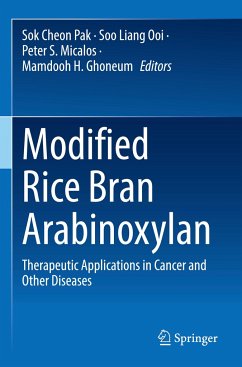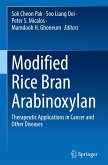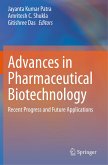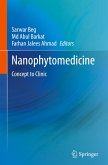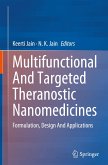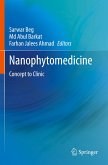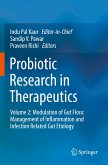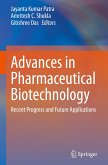Modified Rice Bran Arabinoxylan
Therapeutic Applications in Cancer and Other Diseases
Herausgegeben:Pak, Sok cheon; Ooi, Soo Liang; Micalos, Peter S.; Ghoneum, Mamdooh H.
Modified Rice Bran Arabinoxylan
Therapeutic Applications in Cancer and Other Diseases
Herausgegeben:Pak, Sok cheon; Ooi, Soo Liang; Micalos, Peter S.; Ghoneum, Mamdooh H.
- Broschiertes Buch
- Merkliste
- Auf die Merkliste
- Bewerten Bewerten
- Teilen
- Produkt teilen
- Produkterinnerung
- Produkterinnerung
This book presents the major therapeutic applications of modified rice bran arabinoxylan compound (RBAC) in cancer as well as other chronic inflammatory diseases. Written by active researchers and clinicians in the field of RBAC, the chapters cover the basic science that defines the unique function of RBAC as well as the clinical evidence derived through human studies. Particular focus is on recent findings from research over the past decades. This book is both practical and evidence based. It will be a core resource for researchers, students, and practitioners of nutrition and natural…mehr
Andere Kunden interessierten sich auch für
![Modified Rice Bran Arabinoxylan Modified Rice Bran Arabinoxylan]() Modified Rice Bran Arabinoxylan112,99 €
Modified Rice Bran Arabinoxylan112,99 €![Advances in Pharmaceutical Biotechnology Advances in Pharmaceutical Biotechnology]() Advances in Pharmaceutical Biotechnology186,99 €
Advances in Pharmaceutical Biotechnology186,99 €![Nanophytomedicine Nanophytomedicine]() Nanophytomedicine112,99 €
Nanophytomedicine112,99 €![Multifunctional And Targeted Theranostic Nanomedicines Multifunctional And Targeted Theranostic Nanomedicines]() Multifunctional And Targeted Theranostic Nanomedicines134,99 €
Multifunctional And Targeted Theranostic Nanomedicines134,99 €![Nanophytomedicine Nanophytomedicine]() Nanophytomedicine112,99 €
Nanophytomedicine112,99 €![Probiotic Research in Therapeutics Probiotic Research in Therapeutics]() Probiotic Research in Therapeutics127,99 €
Probiotic Research in Therapeutics127,99 €![Advances in Pharmaceutical Biotechnology Advances in Pharmaceutical Biotechnology]() Advances in Pharmaceutical Biotechnology186,99 €
Advances in Pharmaceutical Biotechnology186,99 €-
-
-
This book presents the major therapeutic applications of modified rice bran arabinoxylan compound (RBAC) in cancer as well as other chronic inflammatory diseases. Written by active researchers and clinicians in the field of RBAC, the chapters cover the basic science that defines the unique function of RBAC as well as the clinical evidence derived through human studies. Particular focus is on recent findings from research over the past decades. This book is both practical and evidence based. It will be a core resource for researchers, students, and practitioners of nutrition and natural medicine, as well as be of value to all healthcare professionals with interest in integrative medicine.
Produktdetails
- Produktdetails
- Verlag: Springer / Springer Nature Singapore / Springer, Berlin
- Artikelnr. des Verlages: 978-981-19-5737-6
- 1st edition 2023
- Seitenzahl: 176
- Erscheinungstermin: 10. Januar 2024
- Englisch
- Abmessung: 235mm x 155mm x 10mm
- Gewicht: 277g
- ISBN-13: 9789811957376
- ISBN-10: 9811957371
- Artikelnr.: 69638089
- Herstellerkennzeichnung
- Springer-Verlag GmbH
- Tiergartenstr. 17
- 69121 Heidelberg
- ProductSafety@springernature.com
- Verlag: Springer / Springer Nature Singapore / Springer, Berlin
- Artikelnr. des Verlages: 978-981-19-5737-6
- 1st edition 2023
- Seitenzahl: 176
- Erscheinungstermin: 10. Januar 2024
- Englisch
- Abmessung: 235mm x 155mm x 10mm
- Gewicht: 277g
- ISBN-13: 9789811957376
- ISBN-10: 9811957371
- Artikelnr.: 69638089
- Herstellerkennzeichnung
- Springer-Verlag GmbH
- Tiergartenstr. 17
- 69121 Heidelberg
- ProductSafety@springernature.com
Dr. Sok Cheon Pak has taught and researched at Charles Sturt University in Australia since 2007. His expertise has been in the field of complementary medicine and has become recognised nationally and internationally through ongoing external research collaborations. His area of interest relates specifically to introducing evidence-based practice to complementary medicine research and practice. This has been based on laboratory experiments incorporating modern medical technologies to identify and evidence the underlying rationale for prescribing therapeutic substances for treatment. Over the years, his principal focus has been on the experimental/clinical application of bee venom to human diseases. The following are two examples of where his research related to bee venom has been acknowledged: (a) His research has been recognised by an invitation from the publishing company Springer to write two chapters on 'Chemical Composition of Bee Venom' and 'Health Benefits and Uses in Medicine of Bee Venom' for the publication of a book entitled "Bee products - chemical and biological properties". This invitation is directly related to his research on honeybee venom, focusing on health benefits and uses in medicine. (b) He was appointed as the Guest Editor of a Special Issue on "Bee and wasp venoms: biological characteristics and therapeutic application" for the journal TOXINS (ISSN 2072-6651). A total of 15 review and research articles were published in that special issue. He currently leads and guides research into nutraceuticals to provide relevant and impactful clinical applications. Dr. Soo Liang Ooi is a practicing nutritionist and naturopath with clinical experience in Australia and Singapore. He holds a Bachelor of Health Science degree from Charles Sturt University, a Master of Business Administration degree from the National University of Singapore, and a Master of Mathematics degree from the University of Waterloo in Canada. Soo Liang Ooi is currently pursuing his Doctor of Philosophy (PhD) in the School of Dentistry and Medical Sciences at Charles Sturt University. His research topic focuses on understanding the immunomodulating properties of rice bran arabinoxylan compound and its effects on the quality of life of cancer patients. His research interests lie in evidence-based complementary medicine, nutritional medicine, naturopathy, herbal medicine, meditation, and integrative cancer therapies. As an avid academic writer, Soo Liang published extensively in major peer-reviewed integrative and complementary medicine journals. He received a nomination for the prestigious Elsevier Atlas award in 2017 for his work on "Transcendental meditation for lowering blood pressure: An overview of systematic reviews and meta-analyses" published in Complementary Therapies in Medicine. He is also a co-editor of the Special Issue books on "Health Benefits of Meditation" for the journal OBM Integrative & Complementary Medicine (ISSN 2573-4393) and "Nutraceuticals in Immune Function" for the open access journal Molecules (ISSN 1420-3049). Dr. Peter S. Micalos is a teaching-research academic at Charles Sturt University, Australia. Peter commenced teaching and researching exercise and sports science in 1997. In 2012, Peter transferred to the School of Biomedical Sciences to align his PhD studies on pain and exercise with teaching and research in biomedicine. Over this period, Peter has published several research articles and scientific papers in human health, exercise, pain, chronic pain, acupuncture, and complimentary medicine. His research has included assessing human physical performance, respiratory and metabolic responses to exercise, pain threshold, spinal nociceptive reflexes, somatosensory evoked potentials, and brain tomography using functional magnetic resonance imaging (fMRI). Peter has presented at National and International research conferences and has supervised several Honours, Masters, and PhDresearch students. Dr. Mamdooh H. Ghoneum is an internationally recognized expert and pioneer in cancer immunotherapy whose work over the past 30 years has fostered a fundamental paradigm shift from using chemotherapy as a main-stay for cancer treatment toward using natural agents that exert anti-cancer activity. He has revolutionized the field of cancer immunotherapy by introducing several unique, non-toxic biological response modifiers (BRMs), including arabinoxylan rice bran (MGN-3/Biobran), gross thymic extract (Thymax), and nanodiamond and nanoplatinum particles. These unique BRMs are manufactured using cutting-edge technology and activate the immune system to kill cancer cells and sensitize cancer cells to chemotherapy. The results of his research are currently being applied in major clinical trials all over the world.
Chapter 1. Introduction to Rice Bran Arabinoxylan Compound.- Chapter 2. Enhancing Natural Killer Cell Activity.- Chapter 3. Immunomodulatory, Antioxidant, Antiangiogenic, and Antiproliferative Effects of Rice Bran Arabinoxylan.- Chapter 4. Anti-inflammatory Agent.- Chapter 5. Integrative Oncology.- Chapter 6. The Therapeutic Application of RBAC in Cancer.- Chapter 7. Radiation Therapy.- Chapter 8. Health-related Quality of Life.- Chapter 9. Chronic Micro-inflammation as 'Friendly-fire' in Aging and Disease.- Chapter 10. Human Immunodeficiency Viruses (HIV).- Chapter 11. Hepatitis.- Chapter 12. Additional potential therapeutic applications for rice bran arabinoxylan compound.
Chapter 1. Introduction to Rice Bran Arabinoxylan Compound.- Chapter 2. Enhancing Natural Killer Cell Activity.- Chapter 3. Immunomodulatory, Antioxidant, Antiangiogenic, and Antiproliferative Effects of Rice Bran Arabinoxylan.- Chapter 4. Anti-inflammatory Agent.- Chapter 5. Integrative Oncology.- Chapter 6. The Therapeutic Application of RBAC in Cancer.- Chapter 7. Radiation Therapy.- Chapter 8. Health-related Quality of Life.- Chapter 9. Chronic Micro-inflammation as 'Friendly-fire' in Aging and Disease.- Chapter 10. Human Immunodeficiency Viruses (HIV).- Chapter 11. Hepatitis.- Chapter 12. Additional potential therapeutic applications for rice bran arabinoxylan compound.

